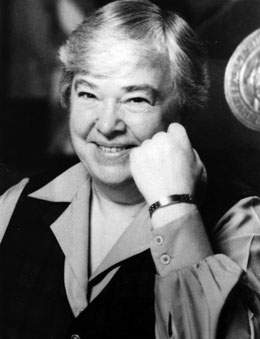On November 2, 1976, Dixy Lee Ray (1914-1994), a conservative Democrat, wins election as the first woman to be governor of Washington. Senator Henry M. "Scoop" Jackson (1912-1983), who earlier in the year lost a bid for the Democratic presidential nomination, easily wins his fifth Senate term. Jimmy Carter (b. 1924), the Democratic nominee, loses the state to President Gerald Ford (1913-2006), but wins the presidency. Six of Washington’s U.S. Representatives win re-election, and Norm Dicks (b. 1940), is elected to an open seat in the Sixth District.
A Controversial Governor
Born in Tacoma, Dixy Lee Ray was trained as a zoologist and served as an associate professor of marine biology at the University of Washington. In 1963, she became director of the Pacific Science Center. In 1972, President Richard Nixon (1913-1994) appointed her to the Atomic Energy Commission.
In 1976, Ray ran for governor as a Democrat. Like presidential candidate Jimmy Carter, she benefited from an image -- completely real in her case -- as an outsider and a non-politician. Ray narrowly defeated Seattle Mayor Wes Uhlman (b. 1935), in the Democratic primary. In the general election she beat King County Executive John Spellman (1926-2018), 54 percent (821,797 votes) to 46 percent (687,039 votes).
In her single term as governor, Ray generated more controversy than accomplishments by reducing welfare, advocating reductions in environmental protections, and supporting nuclear power. She also feuded with the media. In 1978, she named after reporters each of the 11 piglets born at her home. A year later, she treated the press to sausage made from the pigs.
Ray lost the Democratic nomination in 1980 to State Senator Jim McDermott (b. 1936). John Spellman succeeded Ray as governor and refused to talk about the condition of state government. "Well, of course, we had a terrible recession at that point. I suspect that's about I all should say about that," he said (Seattle P-I). After her death, journalist Lou Guzzo (1919-2013), an adviser to Ray said, "...she was a scientist above all else, and told it like it is. Unfortunately, in politics, that can be hurtful. She really wasn't a politician" ( Seattle P-I).
Presidential Loss, Senate Victory
Henry Jackson was always very successful in state elections and 1976 was no exception. He defeated George M. Brown by 75 percent (1,071,219 votes) to 25 percent (361,546 votes). However, at the start of the year, Jackson had higher goals -- he was a leading contender for the Democratic presidential nomination. Jackson had run unsuccessfully for the nomination in 1972, losing in part because he had little name recognition outside his home state. Over the next four years, he made a concerted effort to become a national figure, taking a lead role in denouncing the policy of detente with the Soviet Union and the Soviets’ human rights record, and appearing regularly in nationwide print and broadcast news.
When Jackson announced his presidential campaign on February 7, 1975, he was considered the front-runner. However, he faced a number of liabilities. Although Jackson was a strong one-on-one campaigner, not even his most loyal supporters considered him charismatic and he did not excite larger audiences in person or on television. In addition, with his die-hard support for the recently ended Vietnam War and hard line on the Soviet Union, Jackson had alienated most of the liberal wing of the Democratic Party despite his long-standing support for liberal economic policies, the labor movement, and civil rights. Perhaps in response to the antagonism he faced from the left wing of his party, in his presidential bid Jackson emphasized social issues on which he took a conservative position. He called for law and order and highlighted his opposition to school busing.
Jackson was also handicapped by his position. Jimmy Carter, the former governor of Georgia, was able to begin full-time campaigning a year before the primaries, while Jackson had to attend to his Senate duties. Carter concentrated much of his time in Iowa and New Hampshire, the first two states to select delegates. Jackson’s campaign bypassed those small states to concentrate on the larger industrial states. This strategy failed to consider the media boost Carter got by winning the initial contests. Jackson won primaries in Massachusetts and New York, but his victories got less attention and he could not overcome Carter’s momentum. After losing the key Pennsylvania primary, Jackson returned to Seattle and on May 1, 1976, announced he was ending his presidential campaign and would instead seek re-election to the Senate.
House Incumbents Win
Although Carter won the nationwide presidential vote, ousting incumbent Gerald Ford, he lost the vote in Washington to Ford by 52 percent (777,732 votes) to 48 percent (717,323 votes).
One new member joined Washington’s House of Representatives delegation. Democrat Norm Dicks won the Sixth District seat representing Tacoma, Bremerton, and surrounding areas of Pierce and Kitsap Counties that incumbent Floyd V. Hicks (1915-1992) gave up to accept an appointment to the Washington Supreme Court. Dicks, a former administrative assistant to Senator Warren G. Magnuson (1905-1989), defeated Robert Reynolds by 74 percent (137,964 votes) to 25 percent (47,539 votes). Dicks, now (2003) the senior member of the state’s Congressional delegation, continues to represent the Sixth District.
Washington’s six other U.S. Representatives all won re-election in 1976: Republican Joel Pritchard (1925-1997) in the First District and Democrats Lloyd Meeds (1927-2005) in the Second District, Don Bonker (b. 1937) in the Third, Mike McCormack (b. 1921) in the Fourth, future House Speaker Thomas S. Foley (1929-2013) in the Fifth, and Brock Adams (1927-2004) in the Seventh. Soon after the election, Adams resigned to become President Carter’s Secretary of Transportation. In a special election held on May 17, 1977, Republican state legislator Jack Cunningham (b. 1931) surprised observers by winning the race to replace Adams in the heavily Democratic Seventh District seat representing Seattle and its southern suburbs. Cunningham served one term before Democrat Mike Lowry (1939-2017) won the seat in 1978.

